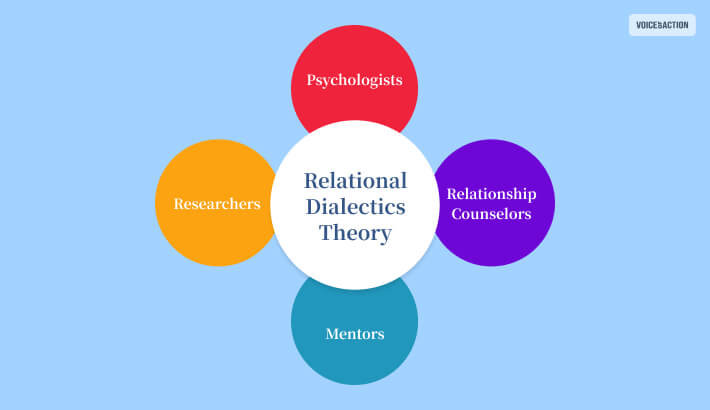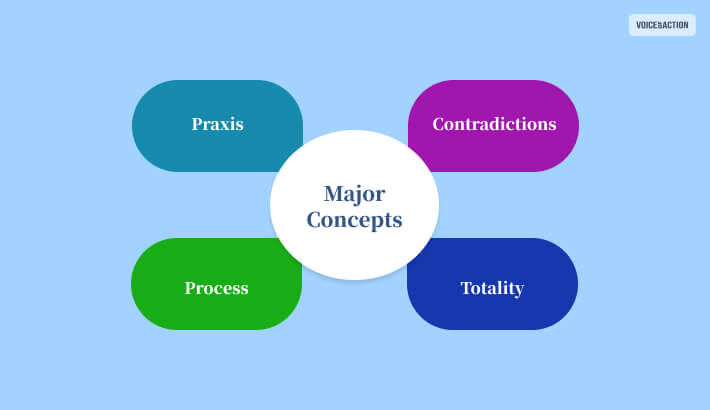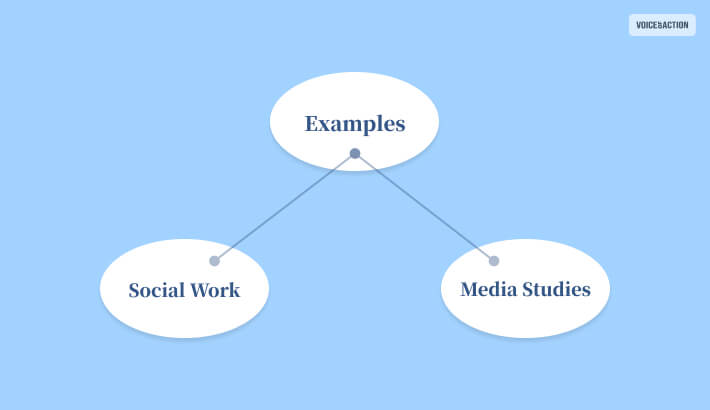Relational Dialectics Theory – Definition, Examples, Pros & Cons

The relational dialectics theory is mainly used to explain interactions between two or more human beings. The concept got introduced in 1988 by L. Baxter and B.M. Matgomery, to focus on relationship contradictions. It is considered to be one of the most critical communication theories to explain relationships between people.
What Is Relationship Dialectics Theory?
The relational dialectics theory mainly believes that relationships between two or more human beings are dialectical processes and are always on the verge of change. This is because human beings are constantly changing, and conflicts within relationships are pretty normal. Therefore, a transparent communication process is necessary for a dialectical relationship if you want to make it sustainable and productive in the long term.
The relational dialectics theory is mainly used by psychologists, relationship counselors, mentors, and researchers. They make use of this theory to find out ways to make relationships work and make them happy and productive for the people who are in a particular relationship.
Major Concepts Of Relational Dialectics Theory

Many scholars and researchers have divided it into four key concepts to make relational dialectics theory easy to figure out and understand. These fundamental concepts of relational dialectics theory are discussed below:
1. Contradictions
In a relationship, there are two different individuals coming from two different backgrounds. These inbuilt tensions make relationships contradictory. Therefore, the relationship encounters two different needs, wants, demands, and desires that are quite contradictory to each other.
However, contradictions (or tensions) in any particular relationship are considered to be normal by relational dialectics theorists. The idea is to work with those contradictions and find out ways to overcome them. Here, you should not try to avoid those contractions, but you should consider resolving them by working out through those contradictions.
Contradictions in a relationship can be of two types:
- Internal Contradictions: When the two individuals in the relationship have different and contradictory needs, desires, and demands.
- External Contradictions: When the needs, desires, or demands of the two individuals contradict one another’s outside a relationship.
To know about the type of contradictions you have in a relationship, you can also take the relational dialectics theory Quizlet test.
Furthermore, if two conflicting ideas in the relationship lead to the formation of a reconciliation so as to bring out a new idea, then it is called dialectical synthesis. It is a Hegelian concept that is used to explain relational dialectics among human beings.
2. Totality
According to the concept of totality in relational dialectics theory, you will need to be aware of all the tensions within the relationship. You should look for one tension (or contradiction) is isolation. Looking for the totality of the relationship will give you its overall view, and you will be able to find out better ways to make things work in the relationship.
Looking at the contradictions in totality is essential because all of them remain interrelated in a relationship. All the contradictions within a relationship impact one another. Hence, it is also necessary to be aware of the internal and external inconsistencies within the relationship.
3. Process
As per the relational dialectics theory concept, relationships always go through a changing process. You can resolve a particular contradiction in a relationship, but others might arise after some time. Apart from that, the same contradiction might come up again after some time, even if it is resolved.
Furthermore, the needs, demands, and desires of the individuals in a relationship might also change with time. This, in turn, can change the contradictions or else can add to the existing contradictions. However, all those contradictions must be worked upon by the individuals.
4. Praxis
Praxis, in relational dialectics theory, is referred to all the actions taken in a relationship to deal with all the contradictions within the relationship. The activity can be anything that might ease, ignore or worsen the contradiction. It includes the things that people do to address the tensions or contradictions they come across in their relationships.
Examples Of Relational Dialectics Theory

To better understand the relational dialectics theory, you will need to look at the following two easy-to-understand examples:
Case 1: In Social Work
Social workers mainly form communities and groups to help individuals to make them go through their daily challenges and sufferings, like domestic violence, loss of a family member, behavioral problems, etc. In such cases, social workers make use of relational dialectics and processes to aid people in working on their communication problems.
Case 2: In Media Studies
A student or a researcher of media studies looks at the way in which media represents everyday life problems and complexities through movies, songs, news, etc. In such cases, the student makes use of relational dialectics theory to examine the communication processes, contradictions, and issues in the portrayed relationships.
Pros And Cons Of Relational Dialectics Theory
Although relational dialectics theory is instrumental in understanding and resolving the issues within a relationship, it still has its own pros and cons. These are explained below:
Pros Of Relational Dialectics Theory
The following are the major pros of relational dialectics theory:
- The relational dialectics theory is entirely related by many and logical too at the same time.
- The theory can be applied at all levels, which include the individual, family, and also society.
- On a practical level, the theory is also a great way of analyzing and resolving relationships between people, both at the personal and social levels.
Cons Of Relational Dialectics Theory
The following are the major cons of relational dialectics theory:
- Since tensions and contradictions in a relationship cannot be quantified, this makes the relational dialectics theory limited.
- The relational dialectics theory also fails to explain the motivations behind the various needs, desires, and demands of individuals in a relationship.
- Although relational dialectics theory is able to find out various contradictions in a relationship, it still fails to give lasting solutions for the prevention of those contradictions.
Summing Up
The basic concept behind the relational dialectics theory makes use of contradictions and opposing tensions. According to these theorists, a relationship is a type of union where two individuals having two different backgrounds are meant to compromise. Because of having two different backgrounds, these two individuals within the relationship continuously face internal tensions within their minds. With time, the pressure creates a way out, which thereby makes the relationship workable and productive.
Read More:

























